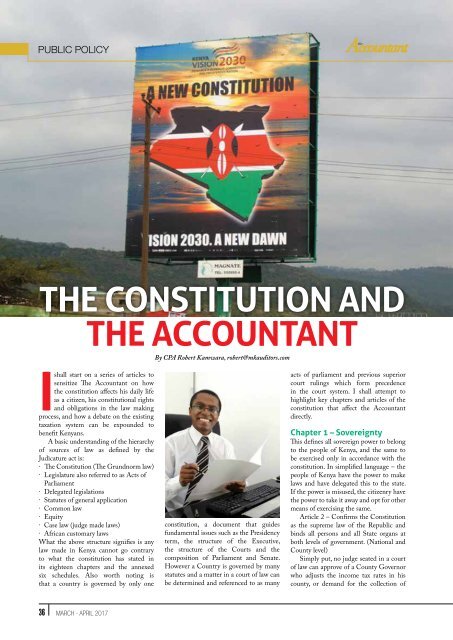The Accountant-Mar-April 2017
You also want an ePaper? Increase the reach of your titles
YUMPU automatically turns print PDFs into web optimized ePapers that Google loves.
Public Policy<br />
<strong>The</strong> Constitution and<br />
the <strong>Accountant</strong><br />
By CPA Robert Kamwara, robert@mkauditors.com<br />
I<br />
shall start on a series of articles to<br />
sensitize <strong>The</strong> <strong>Accountant</strong> on how<br />
the constitution affects his daily life<br />
as a citizen, his constitutional rights<br />
and obligations in the law making<br />
process, and how a debate on the existing<br />
taxation system can be expounded to<br />
benefit Kenyans.<br />
A basic understanding of the hierarchy<br />
of sources of law as defined by the<br />
Judicature act is:<br />
· <strong>The</strong> Constitution (<strong>The</strong> Grundnorm law)<br />
· Legislature also referred to as Acts of<br />
Parliament<br />
· Delegated legislations<br />
· Statutes of general application<br />
· Common law<br />
· Equity<br />
· Case law (judge made laws)<br />
· African customary laws<br />
What the above structure signifies is any<br />
law made in Kenya cannot go contrary<br />
to what the constitution has stated in<br />
its eighteen chapters and the annexed<br />
six schedules. Also worth noting is<br />
that a country is governed by only one<br />
constitution, a document that guides<br />
fundamental issues such as the Presidency<br />
term, the structure of the Executive,<br />
the structure of the Courts and the<br />
composition of Parliament and Senate.<br />
However a Country is governed by many<br />
statutes and a matter in a court of law can<br />
be determined and referenced to as many<br />
acts of parliament and previous superior<br />
court rulings which form precedence<br />
in the court system. I shall attempt to<br />
highlight key chapters and articles of the<br />
constitution that affect the <strong>Accountant</strong><br />
directly.<br />
Chapter 1 – Sovereignty<br />
This defines all sovereign power to belong<br />
to the people of Kenya, and the same to<br />
be exercised only in accordance with the<br />
constitution. In simplified language – the<br />
people of Kenya have the power to make<br />
laws and have delegated this to the state.<br />
If the power is misused, the citizenry have<br />
the power to take it away and opt for other<br />
means of exercising the same.<br />
Article 2 – Confirms the Constitution<br />
as the supreme law of the Republic and<br />
binds all persons and all State organs at<br />
both levels of government. (National and<br />
County level)<br />
Simply put, no judge seated in a court<br />
of law can approve of a County Governor<br />
who adjusts the income tax rates in his<br />
county, or demand for the collection of<br />
36 MARCH - ApRIL <strong>2017</strong>

















